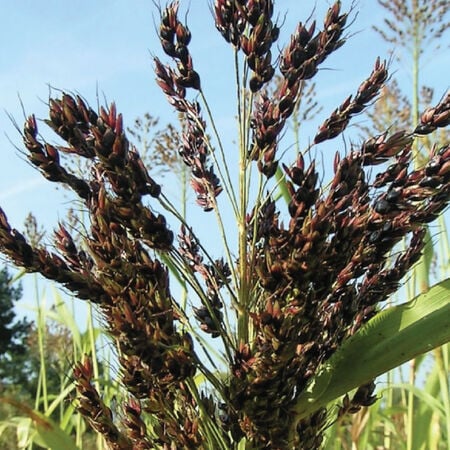Black Amber Broom, Corn Seed
Key Attributes
Key Attributes
Product Details
Weight
.02Plant Height
8-10'Corn Seed Type
UntreatedBotanical Name
Zea maysSeed Type
SeedSeeds Per Pound
27,000Row Spacing
3'Packet
50 SeedsSow Depth
1"Seeds Per Ounce
1,700Fruit Color
MixBreed
Open-pollinatedCorn Height
8-10'Sun
Full SunMaturity
Late SeasonLife Cycle
AnnualSow Method
Direct SowPlant Spacing
6"Categories
CornDays To Maturity (# Days)
105Heirloom
HeirloomSeeds Per Acre
19 lbsComponents
Growing Instructions
![]() Learning Download: How to Grow Corn
Learning Download: How to Grow Corn
Corn is grown for its cob, to make popcorn or for ornamental decoration. It can be made in a variety of different ways, such as grilling, boiling or steaming.
Before Planting: It is not recommended to start corn seeds indoors.
Planting: Cold soil planting risks poor germination. Even treated corn seeds risk low germination under 60°F. Only treated seeds of good cold-germinating varieties may be sown in 55°F soil if warmer weather is anticipated. We recommend planting UNTREATED seeds when soil is warm, at least 65°F. Floating row covers may be used on early plantings to help moderate soil temperature. Each corn variety will state if it is TREATED or UNTREATED in the characteristics tab. Keep Super Sweets corn varieties a minimum of 300 feet from non-Super Sweet varieties. Sow 3/4-1″ deep, 6-7″ apart (treated) & 4-5″ (untreated), rows 30-36″ apart. Arrange in blocks of at least 4 rows for proper pollination, which is needed for well-filled ears. Successive plantings can be made through early summer; most growers prefer to extend the sweet corn season by planting a few varieties of different maturities. Once corn reaches to be 4 inches tall, thin out to 8-12 inches apart.
Watering: Corn must be well-watered due to their shallow roots. Corn requires 5 gallons of watering per square foot of crop.
Fertilizer: Fertilization can be done at the time of planting, as corn is meant to grow quickly, and it is a hungry plant. Fertilize the corn every 30 days. Corn doesn’t prefer a certain kind of fertilizer by following the fertilizer’s instructions.
Days to Maturity: Varies widely with weather conditions and planting dates. Use these figures to compare one variety to another, not to accurately predict maturity on a given day. All corn varieties will have average maturity dates available. Also can be search by early, mid and late season harvest corn varieties. (See each variety for days to maturity)
Harvesting: When kernels are full and “milky,” generally indicated by a drying and browning of the ear silks. Record the date on which about half the plants show silk. Corn is ready to eat 18-24 days after ear silks first show; the warmer the weather, the sooner you can pick it.
Tips: Weed carefully to not damage the roots. Water retention may be done by mulching the corn plants.
AVG. Seeding Rate: 1M/500′, 5M/2,500′, 25M/12,500′, 30M/acre at 2 seeds/ft. in rows 36″ apart.
Seed Count: Average seed counts can be found on each variety corn variety page. On average a 1 ounce packet will sow a 75′ row at a seed sowed every 6″.
Shipping Schedule
Our Seed Promise
 "Agriculture and seeds" provide the basis upon which our lives depend. We must protect this foundation as a safe and genetically stable source for future generations. For the benefit of all farmers, gardeners and consumers who want an alternative, we pledge that we do not knowingly buy or sell genetically engineered seeds or plants.
"Agriculture and seeds" provide the basis upon which our lives depend. We must protect this foundation as a safe and genetically stable source for future generations. For the benefit of all farmers, gardeners and consumers who want an alternative, we pledge that we do not knowingly buy or sell genetically engineered seeds or plants.
The mechanical transfer of genetic material outside of natural reproductive methods and between genera, families or kingdoms, poses great biological risks as well as economic, political, and cultural threats. We feel that genetically engineered varieties have been insufficiently tested prior to public release. More research and testing is necessary to further assess the potential risks of genetically engineered seeds. Further, we wish to support agricultural progress that leads to healthier soils, to genetically diverse agricultural ecosystems, and ultimately to healthy people and communities.
To learn more about the "Safe Seed Pledge" please visit www.councilforresponsiblegenetics.org.

